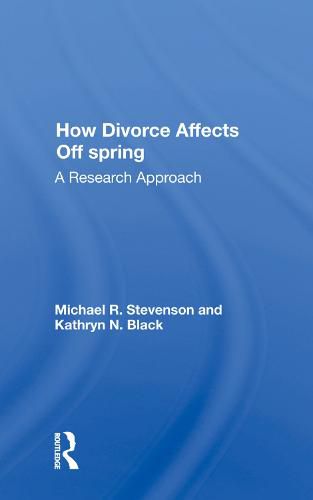Readings Newsletter
Become a Readings Member to make your shopping experience even easier.
Sign in or sign up for free!
You’re not far away from qualifying for FREE standard shipping within Australia
You’ve qualified for FREE standard shipping within Australia
The cart is loading…






In Qur experience, there is bias and inconsistency in much of what is written about the effects of divorce on offspring. When interested students have asked for appropriate resources, we have been hard-pressed to respond without providing a long list of contradictory sources. Much of what is currently available reflects the cultural bias that parental divorce is one of the worst things that can happen to offspring. This book has grown out of our desire to provide a comprehensive, accessible, balanced, and readable resource for upper-level undergraduate and graduate students who are interested in the effects of divorce upon offspring. We also hope that it will be useful to parents and practicing professionals who are not familiar with the empirical literature addressing this situation. Our primary goal is to evaluate and summarize the empirical literature in this field. However, we illustrate important points with examples drawn from autobiographies completed as part of a class assignment or from client histories based on one of the author’s (KNB) counseling with families who are experiencing separation and divorce. We have selected life stories that describe problems in order to show possible results and that even difficult situations can have a positive resolution. Although the individuals involved may recognize themselves, there is insufficient information for anyone else to make an identification.
$9.00 standard shipping within Australia
FREE standard shipping within Australia for orders over $100.00
Express & International shipping calculated at checkout
In Qur experience, there is bias and inconsistency in much of what is written about the effects of divorce on offspring. When interested students have asked for appropriate resources, we have been hard-pressed to respond without providing a long list of contradictory sources. Much of what is currently available reflects the cultural bias that parental divorce is one of the worst things that can happen to offspring. This book has grown out of our desire to provide a comprehensive, accessible, balanced, and readable resource for upper-level undergraduate and graduate students who are interested in the effects of divorce upon offspring. We also hope that it will be useful to parents and practicing professionals who are not familiar with the empirical literature addressing this situation. Our primary goal is to evaluate and summarize the empirical literature in this field. However, we illustrate important points with examples drawn from autobiographies completed as part of a class assignment or from client histories based on one of the author’s (KNB) counseling with families who are experiencing separation and divorce. We have selected life stories that describe problems in order to show possible results and that even difficult situations can have a positive resolution. Although the individuals involved may recognize themselves, there is insufficient information for anyone else to make an identification.